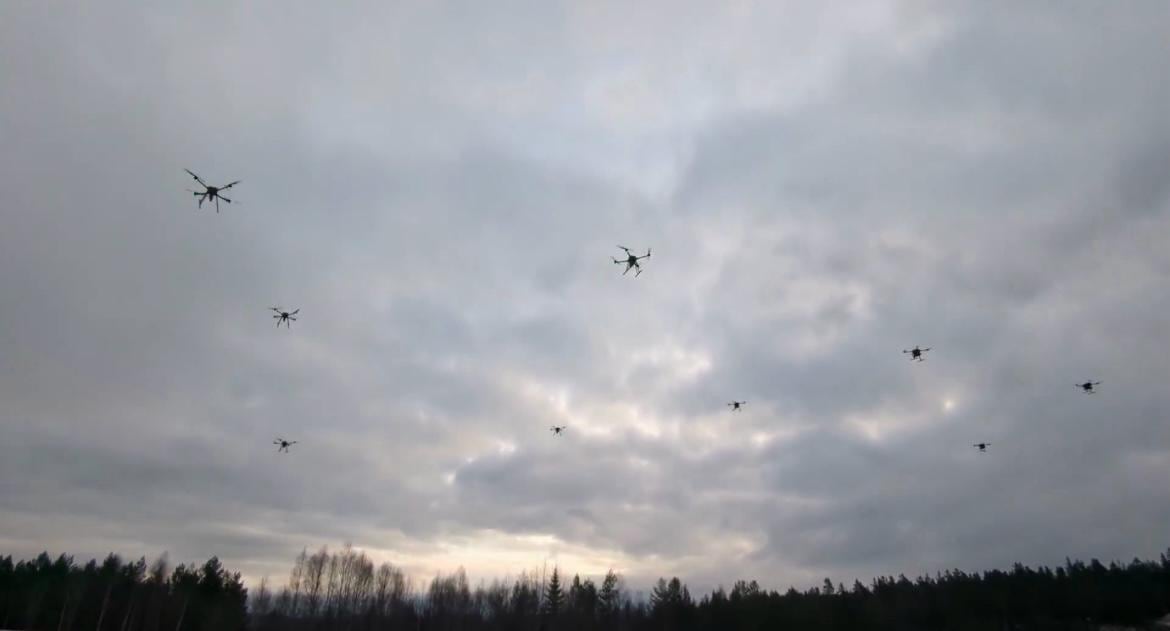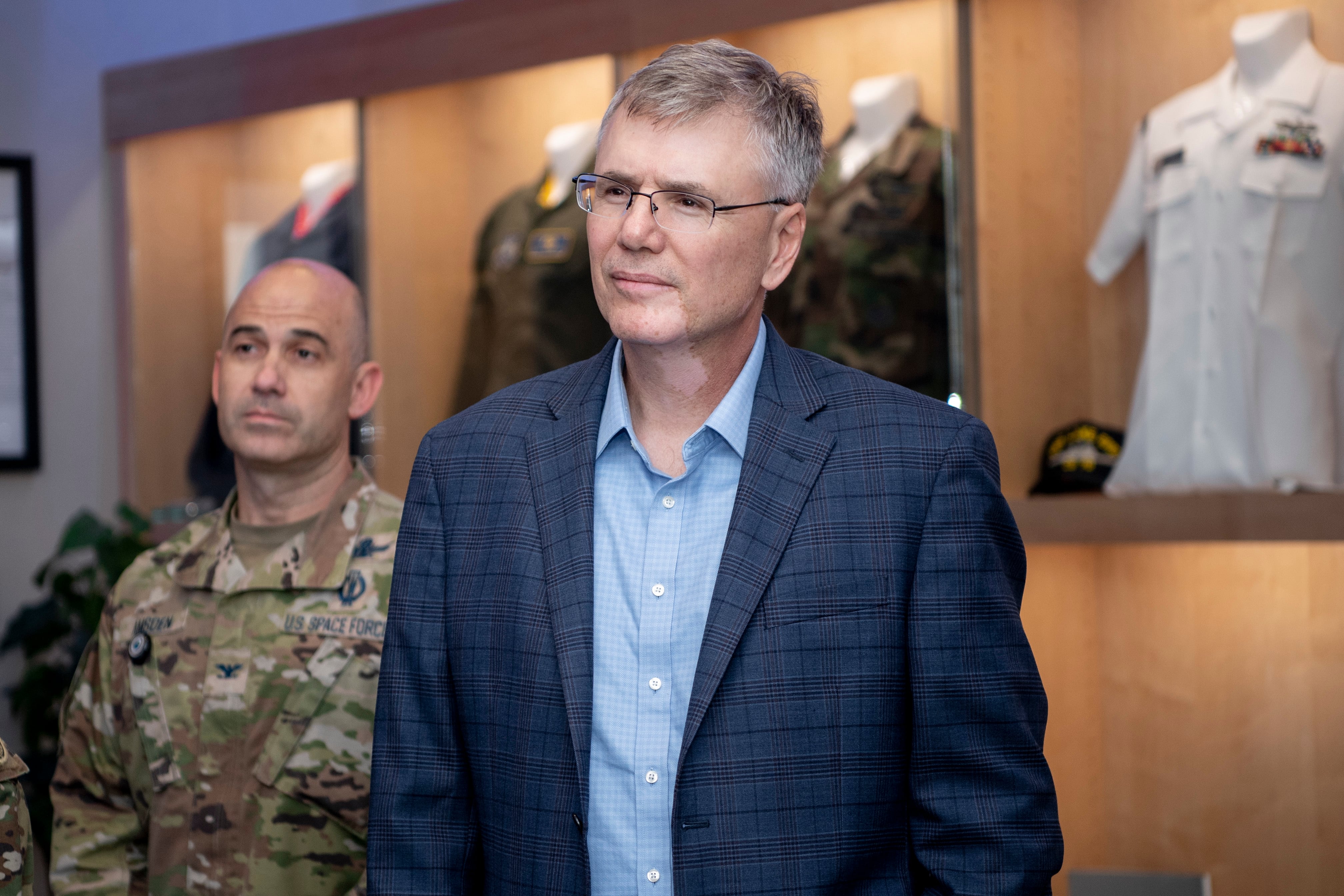BEERSHEBA, Israel — Israel’s new cyber defense training school is set inside a high-tech park in the southern city of Beersheba. Opened in August, the modern campus is part of the J6 and Cyber Defense Directorate, and it’s part of a broader move by the Israel Defense Forces to shift units south.
Defense News spoke with three senior officers at the training center to discuss their goals and how cyberspace is changing how Israel’s military functions. Capt. Noa Givner, who leads the school’s department of data science, has served with the IDF for seven years; Maj. Noam Bright, head of the department of computer science, has served for 12 years; and Maj. I, chief of the department of cybersecurity, has served for 10 years. (The full name of Maj. I was not provided for security reasons.)
This interview was edited for length and clarity.
What is the school’s purpose?
Maj. Noam Bright: We are here in the school of data science of the J6 directorate, of the C4i [command, control communications and computers/cyber and intelligence] forces. What we are doing is taking 18 year old and making them special technology experts. What we do the best is training them in all the high-tech fields — from data center management to cloud-centered training to programming and being the best software engineers.
Our graduates go to all the technological units across the army — from the Air Force to the Navy and the Ground Forces — and here in the school we train more than 1,500 students a year. We don’t focus on pre-knowledge, but on the way they think. There are exams to get into the school; if they think well, we take them to our school and we are responsible to train them well, and our graduates become entrepreneurs and end up in startups.
We moved here three months ago from Ramat Gan [in central Israel]. What we are doing here is not just changing the base and location but creating an ecosystem to empower this region and the children here to come to our school and have access to technological fields.
Capt. Noa Givner: They teach Python [a programming language], and we give them tools so they can train here and get a profession in high-tech fields and serve in technological units. There is also a program that trains soldiers on the spectrum [or those with autism].
Maj. I: Our goal is to provide opportunities to many social groups in Israel, not just in the Negev but also to promote women and others in society, and give them the opportunity to empower themselves in the army and outside of the service.
Bright: We have many special programs, such as a women’s preparation course; 52% of our soldiers are women, and the head of the school is a woman.
Were these fields previously dominated by men?
Givner: Yes. But here in Basmach Maslul Alpha, [the name of the school in Hebrew], women are in charge. Out of five colonels, four are women. The next brigadier general of the tech division is a woman.
How has the demand for technology and this kind of training changed over the last decades?
Bright: The demand for tech in the army was less than we see now; we see a big increase, by three or four times than when I was recruited. It used to be four units’ worth was recruited for technology, and now [we recruit for] 10 units.
Givner: People are going into the field to make decisions with data. They are serving now, and not just in the technological units; they have to help the army base decisions on data for the next battle or escalation. Now there are data analysts at the division level.
Maj. I: We don’t go only by foot with tanks; we attack from the air and on networks, we attack using different fields. Cybersecurity entered the army [in a big way] five years ago to defend the networks.
Givner: The next battle and threat is on the net, such as with Iran.
Bright: The number [of soldiers we are training] has increased because the demand has grown. For instance the army nowadays is based on technology — whether operations or non-operations, from logistics to human resource management. This demand has grown a lot, especially in the last two to three years.
In terms of software and applications, is the army creating applications itself?
Maj. I: It’s complicated. Some systems we buy, some we develop for our needs. And if we buy something, we adjust for the army’s needs, and it is classified.
What about artificial intelligence and the five-year modernization plan Momentum?
Givner: We are planning for the future in the data department. In the next [several] years, the IDF will own an AI lab so it can bring in the future things [needed] in the army. [Artificial intelligence] needs to be more developed. We can see that AI systems can make good decisions, and not just for commanders. In the end, we are humans, and we can’t make decisions like machines. It will help in the future combat field.
Bright: It’s not just in the data sector. In programming, we train [soldiers] to make algorithms based on AI and neural networks. We have exercises that deal with AI ... to identify things from pictures.
Maj. I: The army started with programming and cyber and DevOps — and the data field is a new one. When you combine all of this, [it’s] AI.
How would you characterize digitization in the IDF?
Maj. I: In the past, the Navy and the Air Force did not work together. Digitization is about cooperation and technological change. Thanks to the systems we built in tech units, they can work together and shorten the fire circle [closing the gap between sensor and shooter].
How do you train for launching cyberattacks against adversaries?
Bright: We can’t speak about that.
How do you deal with an overreliance on technology? For example, units in the field might become dependent on certain applications.
Bright: It’s not related to our school. You always have a plan B, and offline there are alternatives; people plan for not having a network.
Do you deal with unmanned systems?
Bright: We train people to know their algorithms, but it depends. With units, we train them on the practical aspect, not theory. It’s 65% practical [training]. If a soldier goes to a program course, they go to learn bugs in code, for instance. We do a lot of trial and error.
Are most of the soldiers coming here directly from high school?
Bright: Yes, but after this they can go to earn an academic degree while they serve.
Maj. I: In the last several years, the army understood it needs to move all the units to the Negev, and it created [a center for most of the J6 units]. We are creating many areas of cooperation between the army and Ben-Gurion University [in the same city as the training center], the municipality of Beersheba and the technological ecosystem here.
Givner: We collaborate with high-tech companies in the park here. They come to our students, and students get lectures about new technology.
We work with the Ministry of Education on the Bagrut [standardized exam for the end of high school]. We developed a new program for data science, not just computer science; now they have data science courses, and we bring teachers here to learn what students to better prepare for military service.
Is it difficult to join this training school?
Bright: We are open to all of Israel’s society, not just those with previous knowledge. We’ve see a 50% increase in demand to get into the training center, and the army understands the need for technology and has increased the number the army allows us to train during the year. We already doubled and tripled the space we have here.
Maj. I: And in a few months we will expand again.
Givner: We doubled all the courses — some from 20 to 60 students.
If there are more soldiers in technology units, what gaps are left over as a result in other army areas?
Bright: The army now knows to optimize where people go. In the past, the army may have had soldiers end up in positions that didn’t fit them, and they could have been programmers. Now we are able to fit the position to soldiers in their service.
Givner: In the past, if you were allergic to gluten, you’d be excused from army service. Now we implement adjustments to recruit [those who might have been rejected in the past].
Do those who join this training program take a special test?
Givner: Yes, to filter out the right candidates.
Bright: It’s very special ecosystem here. Last week, a U.S. two-star general was here and was fascinated by what we are doing and the way we teach, how we take 18 year olds to make them technological experts. [The general] wants us to go to California to teach them what we are doing here. They aren’t do a programming course in five months; theirs is a year.
Editor’s note: The IDF declined to name the U.S. two-star general.
Seth J. Frantzman is the Israel correspondent for Defense News. He has covered conflict in the Mideast since 2010 for different publications. He has experience covering the international coalition against the Islamic State group in Iraq and Syria, and he is a co-founder and executive director of the Middle East Center for Reporting and Analysis.







